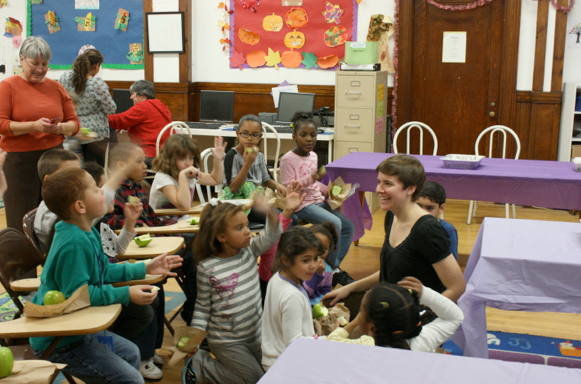Since I joined The Family Dinner Project team several months ago, I’ve learned what most of the parents out there already know — that cooking with children is a messy, noisy, energetic, exhausting and sometimes scary process. It’s also one of the most fulfilling things I get to do all day.
We had so much fun making soup with Centerboard, the afterschool literacy program run by local Lynn social service agency, that we decided to do it again. We arrived at the Boys and Girls Club in Lynn, MA equipped with the ingredients to make enough potato dill soup (see below) for twenty five families!
While Joanna and I set up to cook, Centerboard’s Jan Plourde read Stone Soup to the group of children. In the story, impoverished villagers initially hesitate to share any food they have. However, each community member eventually lends an ingredient to make a delicious and nutritious soup for everyone to share — perfectly complimenting the afternoon’s activities!

The first order of business for the group was making animals out of bread dough. The recipe, also below, came from Joanna’s kindergarten teacher who used to make bread with her class every Friday! (Can you even imagine?) With the bread cooking in the oven and making the room smell delicious, we were ready to get to work on the main course.
A number of children took soup home for their families while others stayed to share food, fun, and conversation with The Family Dinner Project team. We played games like “I Spy” and talked about thankfulness. To celebrate FDP Executive Director John Sarrouf’s birthday, the children surprised him with candles in the apple crisp and a rousing rendition of “Happy Birthday.”
At the end of the dinner, I was exhausted (and covered in soup) but happy as a clam. I’m already looking forward to our next dinner with the Centerboard group in a few weeks! Until then, here’s the recipe we used for our soup:
Dilly Bean Potato Soup (from Simply in Season)
Serves about 6
1 hour cook time
2 stalks celery (about 1 cup chopped)
3 carrots
2 cloves garlic (minced)
In large soup pot, sauté in 6 tablespoons oil.
6 cups chicken or vegetable broth
4 or 5 large potatoes (diced)
Salt to taste
Add and simmer until potatoes are tender, 20-25 minutes. Mash some of the potatoes in the broth mixture for a creamier texture.
4 cups cooked Great Northern or navy beans
1 tablespoon dried dill weed
Add to soup.
6 oz. plain yogurt or sour cream
1.5 Tablespoons flour
Pepper to taste
Combine and stir into soup. Cook and stir until thickened.
Serve and enjoy!
And of course, the delicious bread recipe:
Kindergarten Bread
Makes 2 loaves.
- Dissolve 2 packages dry yeast in 6 c warm water
- Add 4 T honey, 4 T veggie oil, 1 T salt, 3 c whole wheat flour (we often used whole wheat pastry flour for a lighter loaf).
- Stir vigorously until your arm gets good and tired.
- Add additional flour 1/2 c at a time (up to 3-4 cups) until it’s too stiff to stir.
- Transfer to a floured board and knead adding more flour as needed until you have a dough that will leave the board and your hands without much extra flour.
- Knead the big old thing for 10 — count ’em — 10 minutes. The dough should be elastic-ish. (I tend to put in less flour because you can overdo it and your bread will be dense.)
- Form dough into a ball and place it in a greased bowl (I use spray canola) and turn it over so the whole darn thing is coated.
- Cover the bowl with plastic wrap or a slightly damp dish towel and let rise in a warmish place until it is doubled in size (1 1/2 hrs.)
- Uncover, gently punch dough down. Cover bowl and let rise again until doubled (maybe only an hour this time.)
- Butter or oil-spray your pans. Divide dough in half. Knead each piece for a minute then flatten it into a rectangle and roll it up tight. Seal the seams by pinching them together. Imagine it is someone you like that you are slightly mad at so you don’t pinch too hard. You just want to get your point across. Put it into your pans nice and neat like.
- Cover the pans and let rise again until not quite double.
- Oven @ 350 degrees for 30-40 minutes. I check for doneness by taking 1 loaf out of the pan and thumping its bottom. It’s done when you hear a hollow sound.
Recipe courtesy of Bill Roberson, Kindergarten Teacher at Sierra Waldorf School in CA.